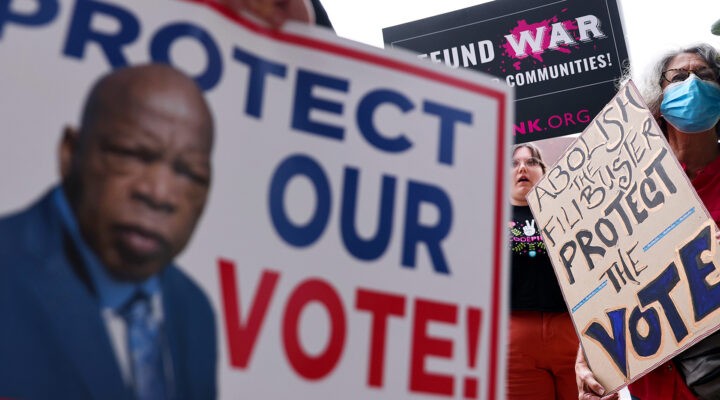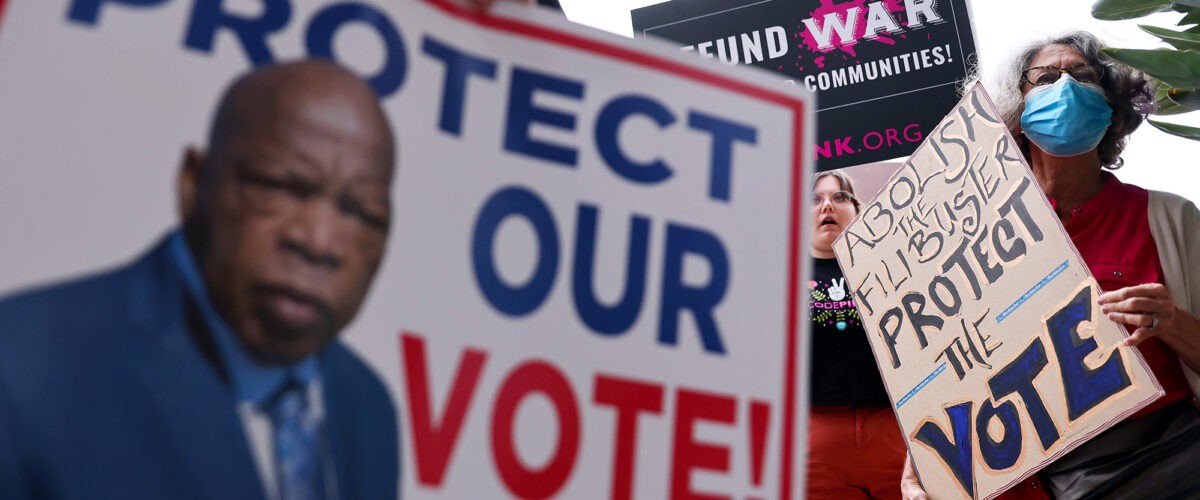Even with frequent emotional appeals for the passage of two voting rights bills — the For the People Act and the John Lewis Voting Rights Act — Senate Republicans, along with Democratic holdouts Joe Manchin and Krysten Sinema, defeated the Democrats’ best efforts to “safeguard our democracy.”
Both bills were hotly contested, as Democrats argued that the legislation was necessary to counter GOP state legislatures from passing laws that restrict voting rights, while Republicans claimed the bills simply represented Democratic attempts to consolidate power and control elections.
Warnock’s analysis
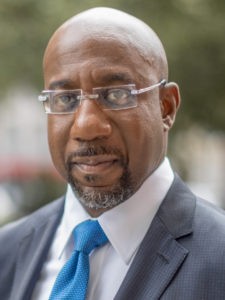
Raphael Warnock
On Martin Luther King Jr. Day, Jan. 17, Sen. Raphael Warnock, D-Ga., was a guest on ABC’s The View. He connected the current effort to guard the voting rights of people of color to the work of MLK, more than 50 years ago. He said:
The 15th Amendment had been in place for a hundred years before the Civil Rights Movement. We had in place the right to vote, but folks found all kinds of ways of blocking that access. Dr. King actually himself talked about it in a speech we don’t lift up nearly enough. It was in front of the Lincoln Memorial. It was not in 1963. The first time he went there was in 1957, and his ringing cry that day was give us the ballot. In that speech in 1957, Dr. King talked about all kinds of conniving methods being used to block people’s access to the franchise. Sadly today, over a half century after his death, we have witnessed new conniving methods. That’s why we have to pass the two bills, so people can realize the promise that is on paper.
Warnock’s analysis was piercing and, in my view, prophetic. His passionate plea included this familiar reference: King “used to say that the arc of the moral universe is long, but it bends toward justice. So, he kept bending that arc then. We have to keep bending that arc now.”
Common Cause’s perspective
Common Cause, a watchdog group in Washington, D.C., with chapters in 35 states, was founded in 1970 by John W. Gardner — interestingly, a Republican. Its mission is “upholding the core values of American democracy.” According to this national organization, the original Voting Rights Act (1965) was a significant step in our national Civil Rights Movement, which has been used to protect Americans from voter suppression. Common Cause reports:
States and counties with a history of voting discrimination had to pre-approve any changes to their voting rules with the Department of Justice — which stopped thousands of bad laws from taking effect. But when the Supreme Court gutted that pre-clearance requirement with the Shelby County v. Holder decision in 2013, it invited opportunistic politicians to attack voters’ rights, passing new laws that would have never stood up to review, and making it harder for eligible Americans to have their votes counted.
Since the 2020 presidential election of Joe Biden, and the Big Lie conceived and promoted by Donald Trump, opportunistic Republican state politicians have been busy passing obstructive laws across much of the nation. The Brennan Center for Justice at the NYU Law School published an end-of-year report which reveals that “between January 1 and December 7 (of 2021), at least 19 states passed 34 laws restricting access to voting. More than 440 bills with provisions that restrict voting access have been introduced in 49 states in the 2021 legislative sessions.”
Biden and Harris in Atlanta
President Biden and Vice President Harris traveled to Atlanta, the heart of this voting rights debate, to urge the passage of the two Democratic bills by the Senate, even if it would require changing the filibuster rule. During their visit to Ebenezer Baptist Church — the congregation currently led by Warnock and where King once preached — and to the Atlanta University Center Consortium on the campus of Morehead College and Atlanta Clark University, the president spoke plainly and powerfully:
The words of Scripture remind us to hate evil, love good and establish justice in the gate … . Let me be clear: This (fight) is not about me or Vice President Harris or our party. It’s about all of us. It’s about the people. It’s about America. Hear me plainly: The battle for the soul of America is not over. We must stand strong or stand together to make sure that January 6 marks not the end of democracy but the beginning of a renaissance of our democracy. You know, the right to vote and to have that vote counted is democracy’s threshold liberty. Without it, nothing is possible, but with it, anything is possible.
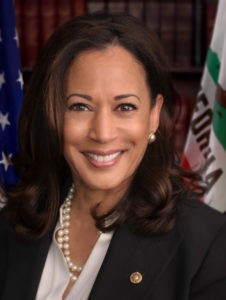
Kamala Harris
Back in Washington Vice President Harris, in an interview with a journalist from the Today Show, clarified whom she held responsible for defending democracy. She said: “I will not absolve the 50 Republicans in the United States Senate from responsibility for upholding one of the most basic and important tenets of our democracy, which is free and fair elections and access to the ballot for all eligible voters.”
If only three Republicans had broken ranks
But the rhetoric of Biden and Harris resulted in no change in the numbers. The congressional gridlock was insurmountable. Fifty Republicans refused to budge. So the Democrats tried to shield the ability to pass the voting rights legislation from the filibuster — what The Economist describes as “an arcane legislative procedure that requires a de facto supermajority of 60 votes to do most business in the Senate.”
They realized that their 50 votes to set aside the filibuster would be countered by 50 negative votes from the Republicans, in which case the tie would be broken by Vice President Harris. But Senators Manchin and Sinema would not agree to this strategy, so the filibuster remained in effect and the effort to secure voting rights for disadvantaged Americans stalled.
If only three “good” Republicans had seen the connection between this legislation and our democracy and joined the 48 Democrats in a bipartisan vote, the laws could have been passed — but no Republican was willing to go against Mitch McConnell and the Republican bloc.

Joe Biden
This defeat was despite the president’s fervent proclamations about the necessity of voting rights in a democracy and his fierce protestations against Republican political maneuverings. Citing the attack on the U.S. Capitol on Jan. 6 and Republican efforts to pass new voting rules in several states after former President Donald Trump’s loss in the 2020 election, he said: “The attack on our democracy is real. It’s no longer just about who gets to vote, it’s about who gets to count the vote, and whether your vote counts at all” [“Biden calls for passage of voting rights bills in speech on MLK Day: ‘The attack on our democracy is real”].
Biden is clearly frustrated by his Republican colleagues, whom he says are more contentious and immovable than at any other time in his 36 years as a senator (1973-2009). Although he has decades of experience engaging and compromising with the members of the Senate in order to get things done, the president finds his efforts now are fruitless:
The vice president and I have supported voting rights bills since day one of this administration, but each and every time Senate Republicans have blocked the way. Republicans oppose even debating the issue. You hear me? I have been around the Senate a long time. I was vice president for eight years. I’ve never seen a circumstance where not one single Republican has a voice that’s ready to speak for justice now.
Perhaps most disappointing for the president is the fact that 17 Republican senators who in 2006 voted to reauthorize the 1965 Voting Rights Act have now firmly stood against a bill that would restore the strength of these safeguards that were weakened in the 2013 Supreme Court ruling.
“17 Republican senators who in 2006 voted to reauthorize the 1965 Voting Rights Act have now firmly stood against a bill that would restore the strength of these safeguards.”
What’s different now?
So, why did these Republican senators change their vote? What did they feel they had to lose if they sided with the Democrats? The logical guess is their power, position and paycheck. It sounds cynical to suggest that United States senators would choose personal over national benefit, or value their own names on Senate office doors more than Constitutional duty.
Yet, that is exactly what five of them privately told President Biden. Talking about his efforts to accomplish bipartisanship in the Senate, he explained: “I’ve had five Republican senators talk to me, ‘bump into me’— quote, unquote — or sit with me, who’ve told me that they agree with whatever I’m talking about for them to do. ‘But, Joe, if I do it, I’m going to get defeated in a primary.'”
Regrettably, Biden didn’t name the five senators who were so self-revealing. The CNN editor who reported these “true confessions” didn’t reach any conclusions either. Their identity will likely remain shrouded, although any Republican who is facing a reelection battle in 2022, especially in a primary, could have placed self above society.
As frustrating, perhaps, as the 50 Republican members who turned their backs on their fellow citizens was the unwillingness of two Democratic senators — Manchin of West Virginia and Sinema of Arizona — to support the president’s plan to exempt the voting rights legislation from the filibuster rule. In a move that was extremely embarrassing to the president, these two senators claimed to support the voting rights bills yet allowed their fealty to the filibuster rule to trump their faithfulness to the disenfranchised.
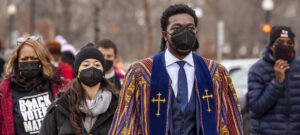
Stephen A. Green and Joceline Garcia lead a group of faith leaders and students on hunger strike sit-in on the steps of the Senate chamber at the U.S. Capitol in a civil disobedience action for voting rights. They are demanding passage of the John Lewis Voting Rights Advancement Act to protect the right to vote. This is a result of the passage of voting restriction laws in 19 states in the last year. Left to right: LaTosha Brown of Black Voters Matter, Joceline Garcia of UN-PAC, and Rev. Stephen Green of Faith for Black Lives. (Photo by Allison Bailey/NurPhoto via AP)
‘The denial of voting rights is evil’
As Congress debated these bills, across the nation Americans on both sides of the political aisle were watching and voicing their approval or disapproval of the Democratic defeat. Many were angry, like Willie D. Francois III, an African American clergyman who is co-chair of the social justice arm of the National Progressive Baptist Convention. He observed: “What does that mean? We keep showing up so that we wear evil down. The denial of voting rights is evil. The protection of Senate rules over the protection of the public is evil.”
Biden’s use of Scripture to talk about hating evil and doing justice, as well as this social justice leader’s pronouncement that denying voting rights is evil, substantiate statistics recently reported by a national news magazine which reveal the broken nature of our Union:
Americans are anxious about the stability of their democracy. Roughly 40% of the politically active say that members of the other tribe are evil; 60% believe they are a threat to the country. More than 80% think the system needs “major changes” or “complete reform.”… Some scholars have gone so far as to warn of the risk of civil war.
I am not prepared to label the two Democrats and 50 Republicans in Congress as “evil.” Perhaps Manchin, Sinema and many of the Republicans were voting based upon their honest convictions about what is right and best. But at least some of these politicians admittedly were bound by their fear of personal retribution from the former president or criticism from their Senate colleagues or defeat at the hands of their constituency the next time their own names appear on their state’s ballot. Such a decision lacks integrity. And it is cowardly.
“Such a decision lacks integrity. And it is cowardly.”
Moreover, it is contrary to the essence of the very faith that many of these senators likely profess to believe and follow.
One of the premier Christian national organizations is The National Council of Churches of Christ in the USA. In a recent blog, the NCC noted that “American democracy is at an inflection point … . When rights of one are denied, we are all impacted … . To deny access to the vote is to deny the very humanity and sacredness of those denied.”
A fellow Christian in a Baptist church where I once was a member asked me how I could be both a Democrat and a Christian. I thought the question was oddly both humorous and judgmental. Now, however, I am tempted to ask how one can be both a Republican and a Christian. For while I am far from being a role model, I am trying hard to live into the biblical truth that what God requires is that I “do justice, love kindness and walk humbly with God” (Micah 6:8).
Therefore, in light of this admonition from Scripture and the recent actions in the Senate, I have to ask, “Where are the good Republicans?”
Rob Sellers is professor of theology and missions emeritus at Hardin-Simmons University’s Logsdon Seminary in Abilene, Texas. He is the immediate past chair of the board of the Parliament of the World’s Religions in Chicago. He and his wife, Janie, served a quarter century as missionary teachers in Indonesia. They have two children and five grandchildren.
Related articles:
Voting rights and the people who died for them: Jonathan Daniels et al. | Opinion by Bill Leonard
Voting rights and the ninth commandment | Analysis by Stephen Reeves
Religious leaders call on Senate to pass voting rights bill — to no avail

